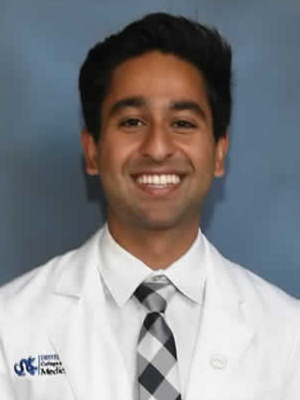AOA Student Research Fellowship Winner Rohan Sehgal Studies Healthy Aging
November 12, 2020
By Lisa Ryan
Rohan Sehgal, of the MD Program Class of 2023, wants to make something clear: the research to which he is contributing isn’t about finding the fountain of youth or the key to eternal life.
“There’s a lot of stigma about ‘Oh, aging research must be about increasing your lifespan to 500 years,’ and that’s definitely not true,” Sehgal said. “Aging research is about making sure you’re healthy for as long as possible, for the time you have.”
Sehgal explained that aging research aims to determine, for instance, how to push back the onset of a chronic condition from 40 to 60. This increases a patient’s health span, the amount of time spent living free from health concerns.

Sehgal recently joined a National Institute on Aging (NIA) project looking for patterns in changes to individuals’ biology as they age. The opportunity came about last spring when Sehgal was named one of the winners of the 2020 Carolyn L. Kuckein Student Research Fellowship, through which the national medical honor society Alpha Omega Alpha (AOA) provides monetary support for medical students to participate in research.
Individual AOA chapters, including the College of Medicine chapter, could choose just one student to represent their school at the national level and hopefully win one of the national organization’s 50 to 70 available awards. Students submitted detailed research proposals complete with proposed timelines, but Sehgal’s plans changed due to the COVID-19 pandemic.
“I had planned to do my research jointly with a summer program,” Sehgal said. “I found out in April that the summer program was canceled, but I still had the fellowship.”
Pushing back his start date to coincide with the fall semester, Sehgal recently joined the lab of NIA Science Director Luigi Ferrucci, MD, PhD, where he will work through spring 2021 to help Ferrucci find patterns in data that the principal investigator has collected over almost two decades.
Ferrucci has been following over 1,400 individuals since the 1990s, collecting blood, urine and other samples to analyze the biomarkers therein, and track their changes over time. Sehgal explained that his role is to review Ferrucci’s longitudinal data with a computational approach, looking for markers of inflammation, changes to proteins and the gut microbiome, and the like.
“I was drawn to this project because I was thinking about the kind of skills I want to gain, and undoubtedly, the future of research in science is computational,” Sehgal said. “In a decade or so, we’re going to be looking at these big data sets ofall of the information that we’re gathering, and using a computational approach to come up with therapies for humans.”
Sehgal is grateful to be working on the project through spring 2021, even though it necessitated finding a balance between his responsibilities as a researcher and as a student.
“All in all, the fact that I get to spend more time on the study and ideally have a paper or poster to show for all the research I’ve done will be extremely rewarding, this year and throughout medical school,” Sehgal said. “I’ve realized that with summer research experiences, you get your feet wet and then summer is almost over. Being able to do longitudinal research is definitely more rewarding in the long term.”
Sehgal is not sure exactly what path he wants to take in medicine, but part of what he finds compelling about the field of aging is that it applies to various specialties. For instance, gastrointestinal specialists can take aging research from bench to bedside to help maintain patients’ gut health even as their microbiome changes with age; a diabetes drug might be found to help prevent age-related loss of vision, allowing a primary care provider to prescribe the medication and save their patient a trip to the ophthalmologist.
Sehgal discovered his passion for aging research as an undergraduate neurobiology major at the University of Washington doing summer research on the neurobiology of aging at University of California, San Francisco. There, he realized that aging wasn’t an unchangeable process – and he also realized he wanted to pursue a medical degree.
Wanting to see what it was like to live abroad but unable to meet neurobiology degree requirements while spending a semester in another country, Sehgal finished his undergraduate studies and applied to jobs overseas.
Looking to gain more research experience ahead of medical school, Sehgal took a job in Germany at the Max Planck Institute for Biology of Aging, where he studied the impact of different drugs on model organisms’ lifespans. After a year, Sehgal returned to the United States, working in the Planck Institute’s sister lab in the Harvard School of Public Health while he applied to medical school.
An undergraduate research experience set Sehgal on the path to medical school, and his work for the Planck Institute helped him prepare for the research that he’s doing today. Although he has only been on the NIA project for a couple of months, Sehgal has already learned from the experience how to be flexible, to troubleshoot, and to change his thinking if data points don’t align with the study’s expected outcome.
“It's about being able to adapt on the fly and see what the data gives you,” he said. “I’ve learned from the research experiences that I've had that things are not going to go as planned, and that’s also true for a doctor treating a patient. What’s important is how open you are to being flexible and adapting your approach to a problem to make it as personalized as possible.”